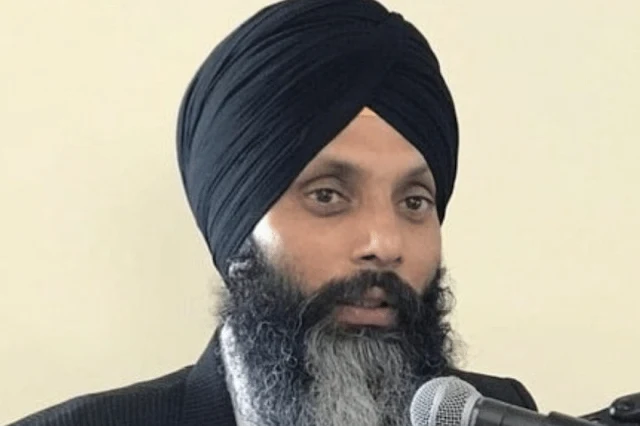By A Representative
In a surprise move, the Indian American Muslim Council (IAMC), claiming to represent Muslim diaspora, said, it "supports" the US Department of State in urging India to cooperate with “a full and open investigation” into Indian government agents’ alleged assassination of Canadian citizen Hardeep Singh Nijjar on the Canadian soil.
It approvingly quoted Canadian Prime Minister Justin Trudeau for stating that Canadian intelligence had ascertained that “agents of the Indian government” carried out the killing of the Sikh community leader in June this year.
Amidst strong protest by the Government of India that Trudeau's stand was absurd, IAMC executive director Rasheed Ahmed said, the alleged overseas killing of Nijjar could constitutes "an extraordinary and unacceptable breach of Canada’s national sovereignty.”
In a surprise move, the Indian American Muslim Council (IAMC), claiming to represent Muslim diaspora, said, it "supports" the US Department of State in urging India to cooperate with “a full and open investigation” into Indian government agents’ alleged assassination of Canadian citizen Hardeep Singh Nijjar on the Canadian soil.
It approvingly quoted Canadian Prime Minister Justin Trudeau for stating that Canadian intelligence had ascertained that “agents of the Indian government” carried out the killing of the Sikh community leader in June this year.
Amidst strong protest by the Government of India that Trudeau's stand was absurd, IAMC executive director Rasheed Ahmed said, the alleged overseas killing of Nijjar could constitutes "an extraordinary and unacceptable breach of Canada’s national sovereignty.”
He added, “If allegations prove to be true, this alleged assassination will have a profound chilling effect on freedom of expression around the world.”
At the same time, Ahmed underlined, “We do not support Khalistan and do not condone Nijjar’s beliefs", though insisting, "No foreign government should be allowed to interfere with a democratic nation by carrying out extrajudicial killings.”
At the same time, Ahmed underlined, “We do not support Khalistan and do not condone Nijjar’s beliefs", though insisting, "No foreign government should be allowed to interfere with a democratic nation by carrying out extrajudicial killings.”
“For the sake of the entire Indian diaspora, IAMC demands a swift, international investigation into the Indian government’s alleged use of violence beyond its borders to target its political and ideological opponents", he said.
Nijjar was ambushed by masked individuals and then fatally shot near a Sikh temple in British Columbia last June. Trudeau reportedly discussed his 'killing by Indian government agents" at the recent G20 Summit with Prime Minister Narendra Modi, American President Joe Biden and British Prime Minister Rishi Sunak.
“Modi has repeatedly proven that he has no qualms about using extrajudicial force to suppress his own citizens. Now it appears that his government is escalating its repression overseas,” said IAMC president Mohammad Jawad.
Nijjar was ambushed by masked individuals and then fatally shot near a Sikh temple in British Columbia last June. Trudeau reportedly discussed his 'killing by Indian government agents" at the recent G20 Summit with Prime Minister Narendra Modi, American President Joe Biden and British Prime Minister Rishi Sunak.
“Modi has repeatedly proven that he has no qualms about using extrajudicial force to suppress his own citizens. Now it appears that his government is escalating its repression overseas,” said IAMC president Mohammad Jawad.
“The international community should be seriously alarmed by the alleged assassination of Hardeep Singh Nijjar, which may pose a serious threat to international security.”
IAMC agreed with Canadian National Security and Intelligence Advisor Jody Thomas stating that India is among the top sources of foreign interference in Canada, pointing out, a report by Canadian intelligence officials raised the alarm of Indian government interference into Canadian economic matters and elections in July 2019. "Political actors affiliated with the overseas wing of Indian PM Narendra Modi’s Bharatiya Janata Party openly intervened in 2019 British elections, trying to sway the electorate in favor of right wing candidates", it said.
Objecting to the Indian government revoking the Overseas Citizenship of India (OCI) of journalist Aatish Taseer, IAMC said, it was "politically motivated retribution for his public criticism of the Modi government".
IAMC agreed with Canadian National Security and Intelligence Advisor Jody Thomas stating that India is among the top sources of foreign interference in Canada, pointing out, a report by Canadian intelligence officials raised the alarm of Indian government interference into Canadian economic matters and elections in July 2019. "Political actors affiliated with the overseas wing of Indian PM Narendra Modi’s Bharatiya Janata Party openly intervened in 2019 British elections, trying to sway the electorate in favor of right wing candidates", it said.
Objecting to the Indian government revoking the Overseas Citizenship of India (OCI) of journalist Aatish Taseer, IAMC said, it was "politically motivated retribution for his public criticism of the Modi government".
"Hindu Nationalist organizations affiliated with Modi’s BJP have persecuted international academics with overwhelming volumes of hate speech, targeting U.S. Prof. Audrey Audrey Truschke and New Zealand Prof. Mohan Dutta in particular", it added.
In the US, continued IAMC in a statement, Hindu nationalist organizations which support Modi’s BJP have sought to "intimidate local minority populations with frightening displays in New Jersey, including parading anti-Muslim hate symbols in a community event last year, and waving the flags of paramilitary groups which kill Indian minorities in India." It added, "In recent years, the Hindu Nationalist organization Hindu America Foundation has tried to silence its critics through extensive litigation, which has all been dismissed."
“IAMC is itself the subject of an extensive disinformation campaign, carried out by former Indian intelligence officials with the aim of challenging our constitutionally protected activism,” Ahmed stated. “If indeed carried out by the Indian government, the alleged killing of Nijar sets a dangerous precedent and can easily be escalated to target individuals with far less of a reason.”


Comments